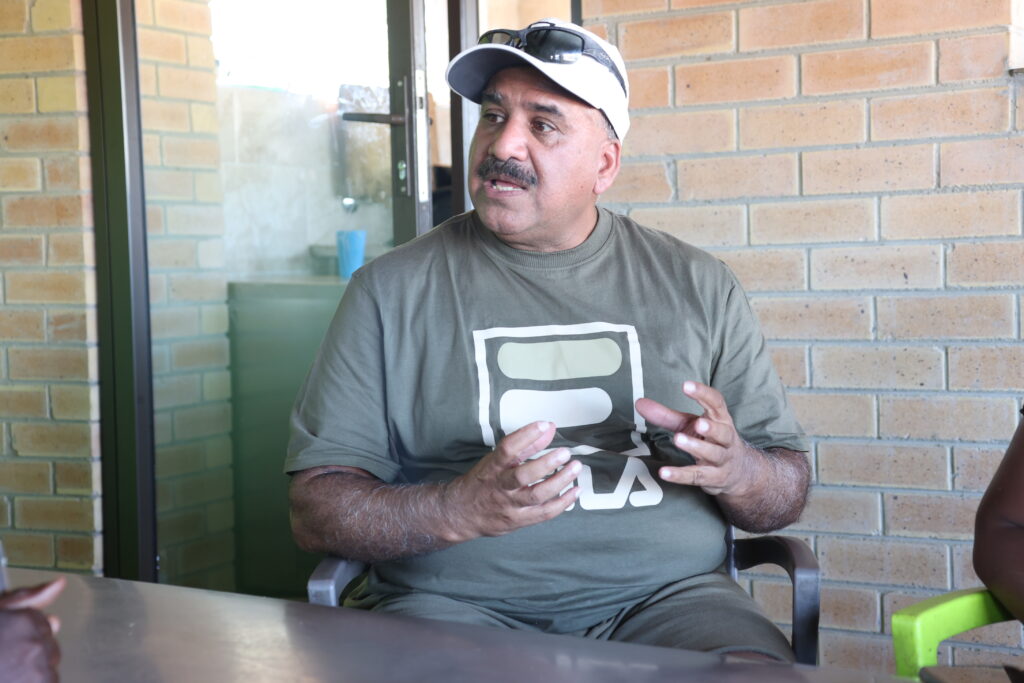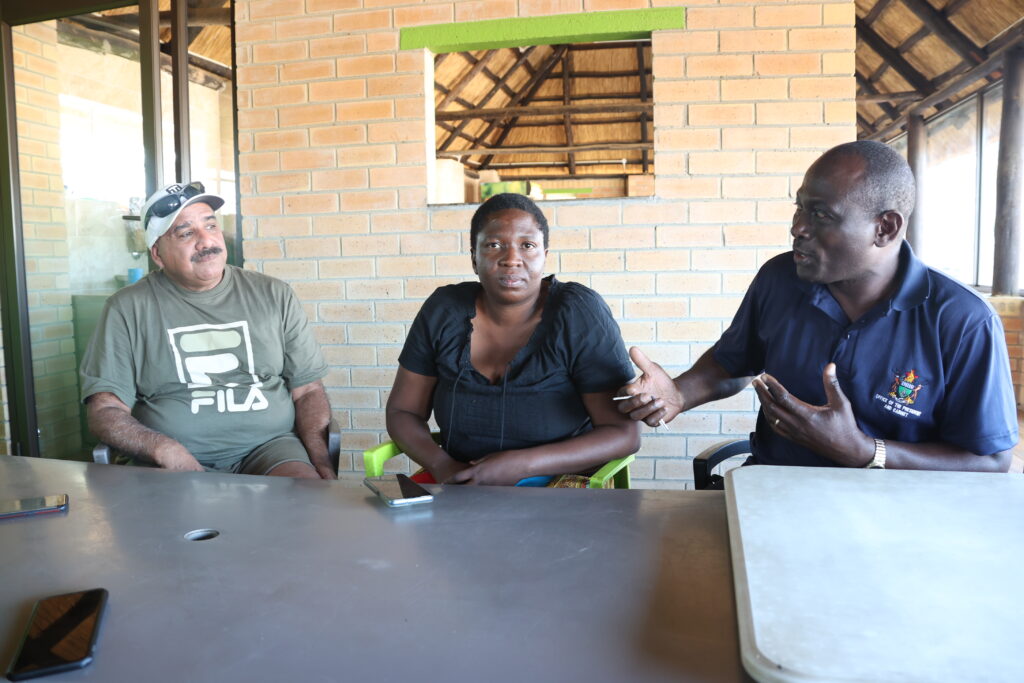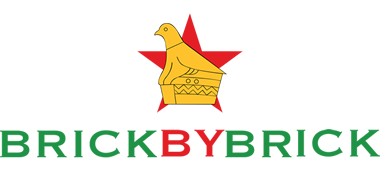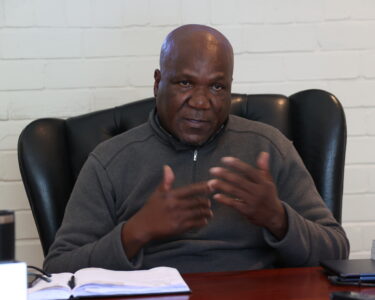When Mohamed Jassat, the Executive Chairman of Interfresh, which owns Mazoe Citrus Estates, heard that the Brick by Brick magazine team was in Matabeleland South in November, he made frantic efforts to meet us. As usual, the Brick by Brick team was busy on the ground checking how Matabeleland South was contributing to the “brick by brick” rebuilding of the country and so meeting Mohamed proved quite a challenge. However, Mohamed was relentless in his pursuit and, finally, on 16 November 2022, he met the team comprising the Editor-in-Chief, Munyaradzi Huni, and the Managing Editor, Baffour Ankomah. As the Brick by Brick team sat down to interview Mohamed, they were joined by the Director of Economic Affairs and Investment, Matabeleland South Province, Richmond Ncube; and the Deputy Director for Coordination in the province, Sikhangele Ndlovu. What was supposed to be an ordinary interview turned out to be an hour-long grilling of Mohamed as the two provincial officials joined the Brick by Brick team, asking the prospective investor tough questions. Mohamed showed that he is a sharp-witted investor as he responded to questions candidly and calmly. Mohamed was quite frank, revealing that when his family’s farm was acquired during the historic land reform programme, “. . . we made an emotional decision. We moved to Australia. I lived in Australia for 10 years before relocating to Kenya. But I can tell you, without a shadow of doubt, that even though I have lived in Kenya and Australia, Zimbabwe is the best place to invest. I will advocate for that and I will sing it from the rooftop.” As soon as the grilling started, it was clear that Mohamed meant business. Zimbabwe in general and Matabeleland South in particular will benefit a lot by listening to his astute advice. Enjoy the fascinating conversation between a shrewd investor, veteran editors and top officials from Matabeleland South Province.
Huni: We finally meet. Can you briefly tell us about yourself and why you insisted on having an interview with the Brick by Brick magazine? Mohamed: I am a Zimbabwean born in Bulawayo. We bought Mazoe Citrus Estates about two years ago when the company wasn’t doing very well. I went into partnership with my colleague from the Middle East. I am the Executive Chairman of Interfresh, which owns Mazoe Citrus Estates. We invested a lot of money into the project and have managed to revive the company.We are now starting to export our products to the Middle East. We also exporting into Zambia, Malawi, Kenya, Rwanda and Uganda. So for the first time, citrus from Zimbabwe has gone into these African markets. We are exporting between 500 and 700 containers of citrus into the Middle East per year. At the moment we are exporting only fresh oranges. In Zimbabwe, whoever is making cordials, most of the juice comes from us. The other thing is that the demand for juice concentrates has gone up. “We also want to invest in Matabeleland South because the province is strategically located next to Beitbridge. The province is right at the border which makes it easy for us to export our products.” There is massive demand. For example, Coca-Cola needs 26 000 drums of concentrate per year and they are currently only able to offer them 11 000 drums. We have gone into partnership with one of the biggest producers of citrus in Matabeleland South and we are making plans to establish a juicing factory. Most of the equipment is already in the country and we plan to invest between US$4 million and US$6 million into the juicing plant that we intend to build around Makhadho in Matabeleland South Province. We want the plant to be commissioned before next season. Hopefully, the plant will be up and running by end of May next year. It will employ about 200 people. The bulk of the juice will go to Cola-Cola and the remainder will be for the export market.

Huni: Why do you want to build this juicing plant in Matabeleland South? Mohamed: We want to build this juicing plant in Matabeleland South because of its proximity to the raw materials. There are a lot of oranges in the province. Also as someone who was born in Bulawayo, I want to make sure that we promote Matabeleland as a region. Our family has been here for many years. We also want to invest in Matabeleland South because the province is strategically located next to Beitbridge. The province is right at the border which makes it easy for us to export our products. Even if we want to import anything, the process will be fairly easy. In addition, the weather here is perfect for the juicing plant. The juicing plant will also be able to process tomatoes, mangoes and guavas. It will process oranges from June, July, August and September. After this the citrus season is over. Once that happens, we are going into partnership with local farmers. If we tell farmers to grow tomatoes and sell them to us, there is not much profit. What we want to do is that the farmers grow the tomatoes, bring them to our factory, we process them and add value. The farmers will share the profit of the end product. This way they will see value in growing tomatoes. We will do this not only for tomatoes, but chilies and so on. We will also set up a canning plant. In the long term, our plans are to work with the Second Republic to establish a dry port in Beitbridge. What is happening at the moment is that a lot of the oranges at the moment are loaded into trailers from Harare to Beitbridge. They are then taken to Durban where they are put into a cold store. From there they are loaded into containers and shipped to different destinations. One of the biggest shipping companies in the world, Maersk, has already agreed in principle to look at possibilities of setting up a dry port in Zimbabwe, especially in Beitbridge where trains from South Africa will pick up containers destined for Durban port. This will cut logistics costs by half. Even the transit time will be reduced considerably. This is good for fresh products because they don’t have to be at the harbour for a long time. Maersk has indicated that the company is keen to invest in Zimbabwe and the next step is to talk to Transnet in South Africa and the Bulawayo Beitbridge Railway to establish the port just outside the border so that trains can come in for us to load our products. This port should be a one-stop shop to clear everything quickly so that the products spend as little time as possible at the border.
Ncube: Are you aware of the Special Economic Zone that the Second Republic is thinking of setting up in Beitbridge?
Mohamed: Is it along the railway line? It has to be along the railway line. We must have access to the rail. Ncube: Yes, it’s very, very close to the railway line. I think with the ideas you have, you are better off interacting with ZIDA (Zimbabwe Investment and Development Agency). ZIDA will advise you according how you can go about with your proposal. You also need to engage the Beitbridge Municipality because they are the owners of the land there. I am sure they will give you all the necessary support. Mohamed: I hear you. It’s imperative that Zimbabwe has a dry port. I am re[1]ally keen to engage with government. You can’t afford to have delays at the border if you are going to export fresh products. Matabeleland South will soon be producing tonnes and tonnes of oranges and we should be ready by the time we start harvesting the oranges. Ankomah: Is Maersk ready to invest in Zimbabwe despite the illegal sanctions imposed on the country? Mohamed: Yes, they are. They are definitely ready to invest in Zimbabwe because to them it makes a lot of economic sense. What will happen is that there will be pre-cools in Beitbridge where our products will be loaded into Maersk containers and transported by train straight to the port in Durban. Once they get to Durban they will be loaded directly into ships. At the moment, Maersk has to have separate precools for Zimbabwe, Zambia, Malawi and all these other countries in Durban. It makes the work very cumbersome.

Huni: You have brilliant ideas. Who exactly have you so far spoken to in government? And how much research have you done regarding your proposal? Mohamed: We have done a lot of research with Maersk and most of the logistics companies. The only obstacle at the moment is Transnet, because it is not reliable. So what we need to do is to engage Transnet at the highest level. In other words, the engagements need to be at government to government level because if I try and approach them in my individual capacity, I feel it’s not going to have the impact we need. If we do this together with government, we will speed up the process.
Huni: I meant here in Zimbabwe, have you approached any government department or ministry? Mohamed. No, not yet. What I have been doing so far is to talk to other players from outside Zimbabwe. To me, it doesn’t make sense to speak to government departments or ministries before finding out if people outside are willing to do what they need to do. Like you asked me, is Maersk willing to invest? I know they are willing to invest. I couldn’t approach government without knowing Maersk’s position. Having managed to go into partnership with my UAE partner, believe me, I know what I am talking about. Additionally in Beitbridge, we want to create a virtual corridor where we can grow fresh products like butternuts, herbs, tomatoes, etc. We should be able to export these products to the Middle East within a short space of time. For example, if we pack a product a 4am in Beitbridge, by 5am it needs to be through the border. There is no room for any delays.
Huni: You are talking about investing in Zimbabwe at a time when some people are saying Zimbabwe is not a good investment destination. Why? Mohamed: I am Zimbabwean and I am also an advocate for Zimbabwe. I have been able to go into the Middle East and tell them about the advantages of doing business in Zimbabwe. What is happening with Zimbabwe at the moment is the perception. Once people some to Zimbabwe and they see the opportunities here, they want to invest even more. “Apart from the UAE, the other powerhouse is Saudi Arabia. I have also started talking to the Saudis and they are very keen to invest in Zimbabwe. As you probably know, a sizeable percentage of our gold goes to the UAE. There is also growing interest in Saudi Arabia, where they are building massive gold plants and they are finding Zimbabwe quite irresistible.” Of course, there are some issues in Zimbabwe which we need to talk about where government needs to help us. Small things that need to be sorted out so that we can attract even more investment. I have very close contacts with the top hierarchy in the United Arab Emirates (UAE) and many want to come and invest in Zimbabwe in a very big way. I can guarantee you that. That is why they are looking at our project and they want to invest more. Some want to invest in mining, others in agriculture, telecommunications and so on. I know some investors from the UAE who want to invest in telecommunications, but they were forced to look elsewhere after the person they approached asked for kickbacks. In the UAE, you can’t do that. Apart from the UAE, the other powerhouse is Saudi Arabia. I have also started talking to the Saudis and they are very keen to invest in Zimbabwe. As you probably know, a sizeable percentage of our gold goes to the UAE. There is also growing interest in Saudi Arabia, where they are building massive gold plants and they are finding Zimbabwe quite irresistible. They want to invest in a gold refinery in Bulawayo. They are already working with a Zimbabwean national with a gold refinery licence. If all goes according to plan, by next year we will have a gold refinery like Fidelity Printers and Refiners in Bulawayo. I am telling you this so that you can see the appetite out there for people to invest in Zimbabwe.
Huni: Let me ask you a very direct question. What do you think about the Second Republic? Mohamed: Let me tell you a story and I will be very frank with you. When the farms were taken away around the early 2000s, we had a farm here in Matabeleland South, not very far from Gwanda. When that farm was taken away, it was very difficult for us. So we made an emotional decision. We migrated to Australia, where I lived for 10 years after which I relocated to Kenya. But I can tell you, without a shadow of doubt, that even though I have lived in Kenya and Australia, Zimbabwe is the best place to invest in. I will advocate for that and I will sing it from the rooftops. There aren’t as many opportunities in the world, let alone in Africa, as there are in Zimbabwe. As long as we rally behind our investors, we will have no issues. Huni: How do you support what you are saying? Mohamed: I am telling you this because we have invested already in Zimbabwe and we are prepared to invest more money. We are an example. The best way to convince anyone that Zimbabwe is the best investment destination is when you have already invested in the country. We are not talking about planning to invest more in five years’ time. Before June next year, we will have injected another US$5 million into Matabeleland South. This is no idle talk.
Baffour: The question he is asking you is that when you went to Australia, did you invest there so that you can do a comparative analysis? Mohamed: It’s very, very difficult to invest in Australia. A lot of people say there is bureaucracy in Zimbabwe. I can tell you it’s worse in Australia. Zimbabwe is simple. I found out that a lot of people who come into Zimbabwe, for example the miners, when they found out what is happening in Zimbabwe, they start saying, “Ahh, Zimbabwe is not a good investment destination”. They say this to protect their interests [from potential competitors]. They don’t want anybody else to come in and see what is happening. I can tell you that for a fact. There are a lot of people saying; “Ahh, don’t come, don’t come”, while they are pouring millions into Zimbabwe. It is not a secret that there used to be a lot of agricultural land that you could partner with locals, that is going away. You can’t find people to partner with and you can’t find good land anymore because wherever you go in Zimbabwe, people are already on it. You know the people who are demonising Zimbabwe. It’s the West, right? However, I am telling you, whoever comes here, they are doing extremely well. When His Excellency President Mnangagwa was in the UAE, I was also there. I can tell you that there is a lot of interest in the UAE to invest in Zimbabwe. The UAE Ambassador in Zimbabwe, I am very close to him. He tells me about all the investors from the UAE who want to come into Zimbabwe. The numbers are shocking.
Ncube: I think after your research outside the country, you now need to engage the entities that are responsible for facilitating investment in Zimbabwe so that they can turn your dream into reality. Mohamed: I know that is very, very important. We are definitely working on that. When (NOT IF) we come into Beitbridge, we are definitely going to engage all the responsible authorities. Remember, we are not new investors in Zimbabwe. We know the procedures and the entities to engage.
Huni: The Middle East is not an easy market to penetrate. What role do you think you can play to assist in attracting more investors from that part of the world? Mohamed: I want to repeat that one area that the Zimbabwean government can target for investments is the Middle East. There are many businessmen in the Middle East who are looking for investment opportunities all over the world. Some of them don’t even know about Zimbabwe. I am talking about powerful people. We need to spend some time focusing on the Middle East. I have seen a lot of people going to Europe in search of investment. Some are flocking to China, but the Middle East is waiting for takers. I believe that I can do something to start bringing investors from the Middle East into Zimbabwe. I know the culture and I know the people. When someone like me goes there, they trust me immediately. We have done things together, we know the language and we know what is happening there. For example, my partner at Mazoe bought the company before he had even set his eyes on the citrus plantation. It was purely on my word. When he came into Zimbabwe and saw what he had bought, it blew his mind
Huni: You are speaking so passionately about investing in Matabeleland South. Do you really have the money to invest? Mohamed: Yes, we do. I have just told you that we purchased Mazoe Citrus Estates and invested millions there. As for the juicing plant in Beitbridge, the equipment has already been purchased. We are going to work with ARDA [Agricultural and Rural Development Authority]. This is money that has already been set aside and is coming to Zimbabwe. Government participation is a priority for us. We need government to help us to achieve our objectives. Investors want assurances that their investment is safe. President Mnangagwa is saying “Zimbabwe is open for business”. This is very good for the country. Government officials should complement the President by giving the necessary guarantees. That way, more people will invest in Zimbabwe. I am very optimistic.
Huni: As someone who has been hunting for me the whole day, is there anything that you want to say that you think we have not yet spoken about? Mohamed: I want His Excellency Pres[1]ident Mnangagwa to know that they are a lot of opportunities for people from the Middle East to come into Zimba[1]bwe in a big way. The setting up of the dry port in Beitbridge is something that has to be looked into seriously
Ankomah: Would you be interested in going into a Public-Private Part[1]nership [PPP]? Mohamed: Yes, we would want to.
Huni (turning to Ndlovu): As we con[1]clude, do you want to say something or ask something? Ndlovu: Umm, not much. I think our economist from the province has said everything that we need to say to an investor as a province. All I can add is that as Matabeleland South we really need investments. There are many op[1]portunities in this province. We are, indeed, open for business. My question to Mohamed is: When is your company going to submit the paperwork because we believe in formality? Mohamed: I am working very closely with officials at ARDA. I will make sure they avail the paperwork to your offices. We have already submitted the papers to them. Without doubt, the juicing factory is coming up. I was born and bred in Bulawayo and Matabeleland is very dear to me. This region made us who we are today. So while investing, we also want to give back to the province. You know wherever I am, if someone speaks in Ndebele, I feel like I am home.
Ncube: This is very exciting news to us as a province. President Mnangagwa is preaching the mantra that “Zimbabwe is open for business”. As Matabeleland South, we want to support your dream so that it becomes a reality. Our Minister of State for Provincial Affairs and Devolution, Abednico Ncube, is very passionate about attracting investment to the province. Just as President Mnangagwa says, we also don’t want to leave no one and no place behind in terms of development. We want to contribute to the country’s Gross Domestic Product (GDP). Your visit to the province is really, really exciting. We are going to support you with all our hearts. Mohamed: I really want His Excellency President Mnangagwa to officiate at the opening of our juice factory. I am also hoping to bring more investors from the UAE to Matabeleland, ekhaya (home)! On hindsight, Matabeleland South boasts so much small livestock, i.e. goats and sheep. Goat and sheep meat is very popular in the Middle East. From my own personal research, there are between 700,000 and one million goats and sheep right here in Matabeleland South. This makes it extremely viable to construct an abattoir to slaughter the goats and sheep specifically for the Middle East market. On the other hand, the Zimbabwe Investment Promotion Agency, ZimTrade, has invited me to accompany them to the Middle East to assist small-scale farmers sell their wares. Most of the farmers who go there are not familiar with international business etiquette. For example, they take with them with a few boxes of peas, green beans, lettuce, etc, but lose out because they lack the requisite marketing skills. Some potential Middle Eastern buyers will ask farmers to send their produce to them with the promise of selling it on their behalf. You can’t run a business that way. What do we need to do? Zimbabwe needs a comprehensive marketing strategy. In this respect, my partner and I are planning to set up pack houses in Bulawayo and Harare. Having done this, we can inform the farmers on the products we are looking for and the prices we are prepared to pay. The farmer knows immediately that if I grow A, B, C, D, this is how much I can sell it for and get paid for it immediately. People like us who understand the market can then pack it and send it to the Middle East. Because we understand the market, we will get the money and then pay the farmers. If small farmers try to do it on their own, it will not work. Can you imagine yourself as a big businessperson in the Middle East and some small businessperson from Zimbabwe says they want to see you? You don’t have time for the small businessperson, do you? But if these small businesspeople pool their products and they are marketed in bulk by a reputable company, businesspeople in the Middle East will pay attention. This is what we need to mount a successful export drive from here. I talk to many businesspeople in the Middle East. They tell me: “We want to assist these people from Zimbabwe, but they are not organised; they seem unprofessional.” We need to join hands as we target the Middle East. The money is there. Lots and lots of it. And the good thing is that our Middle Eastern brothers just love Zimbabwe.



